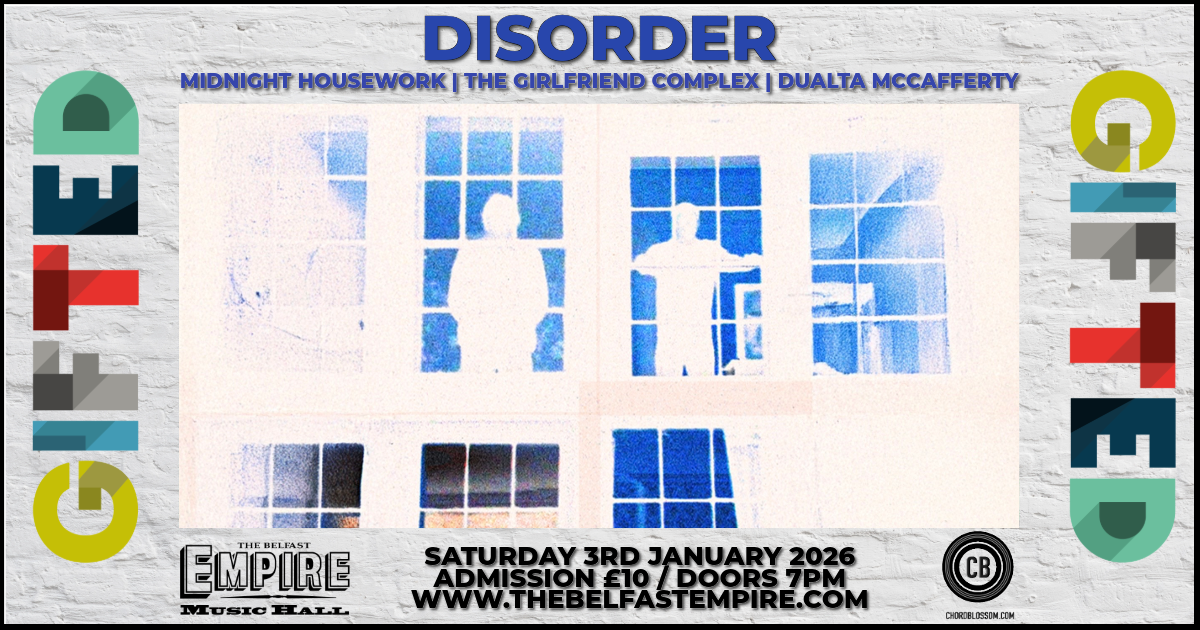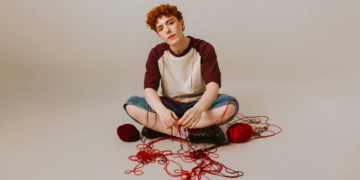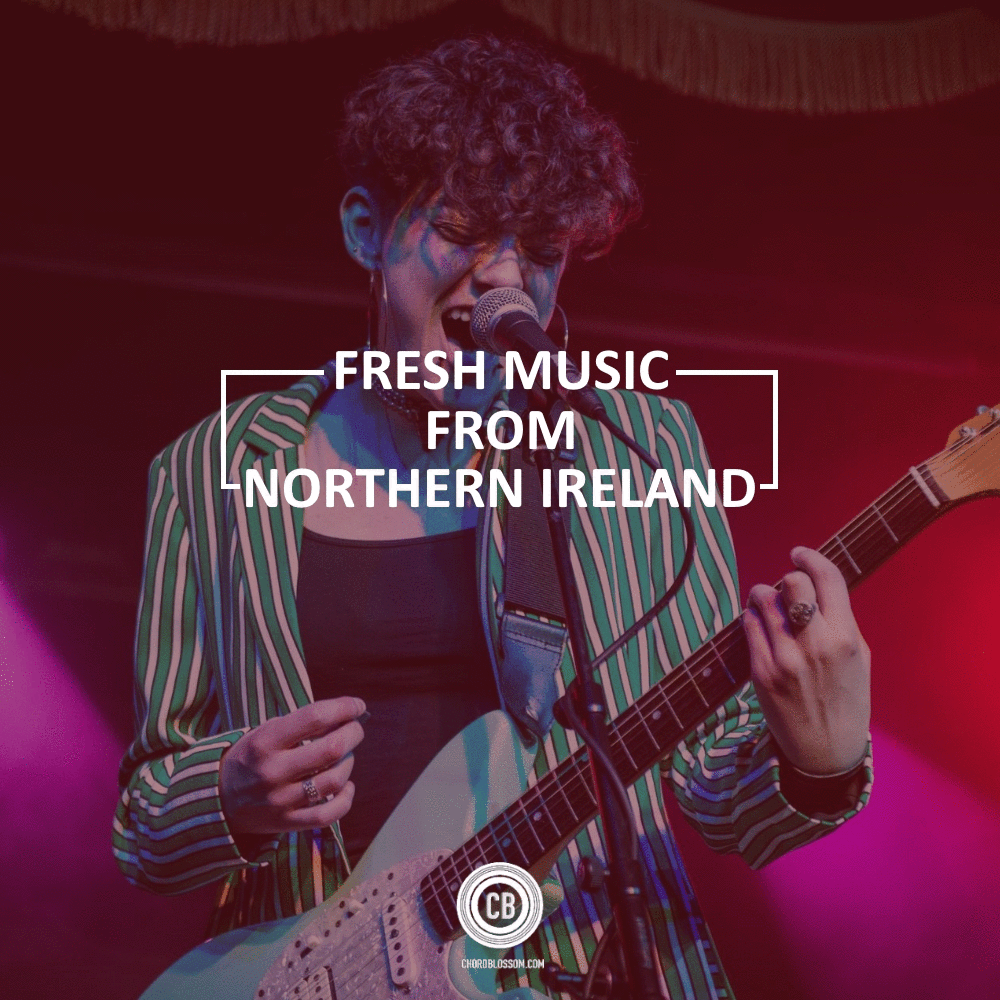Genre-queer, therapy-rock band TRAMP have been gaining momentum in the Irish DIY music scene over the last couple of years, filling up venues and captivating audiences with their unique sound and infectious energy. The public voted to honour TRAMP with the prestigious ‘BBC Introducing: Artist of the Year Award’ at last year’s NI Music Prize and almost one year on fans rejoice as their debut EP is released.
TRAMP’s rebellious spirit and unapologetic authenticity is woven through their brand new EP ‘Bimbofication’, which tackles misogyny in its various forms. I caught up with the four-piece to find out more about the EP, how they incorporate activism through music and their upcoming gigs.
How are you feeling now that your debut EP ‘Bimbofication’ is out?
”We’re relieved to have everything sounding great. When we had the other two singles recorded we weren’t as confident in ourselves or our sound because we were just beginning. With this EP, we feel more confident that these songs are an accurate representation of ourselves and they’re full of fire which we’re really excited about.’’

Can you tell us about the meaning behind ‘bimbofication’?
”It comes from a lyric in ‘Junkie’, one of the songs that’s going to be on the EP. The song and the whole EP is all about misogyny in different forms. So ‘bimification’ seemed like a good sticker to put on an EP that’s full of so much, from diet culture to trauma and internal rage – it’s the start of the conversations about all these things. We like to tackle some really serious issues that we’re passionate about while also having fun with it. ‘Bimbofication’ is a reclaiming of a name that has been used against the feminine, so for us covers a lot of different things under the umbrella of misogyny, which is why it felt like the right word to name the EP.”
How does reclaiming language play into your music and identity as a band?
‘‘Whenever we started the idea of putting together a band, we were going through different band names and TRAMP felt provocative, but it also raises questions around who says it, where it comes from and the intentions behind the word. The context is the power or the disempowerment. We like to start the conversation around what words are okay and who’s telling us is not okay. Even the word ‘‘queer’’, there’s either empowerment or there’s fear from it because people have been hurt by it, for years and years and years. It’s only recently become a great word.”
Can you share how embracing hyper-femininity in your music challenges traditional societal norms about gender? How does this concept manifest in the EP?
‘‘We’ll have a video coming out soon after the EP for the track ‘Junkie’ and the word ‘bimbofication’ was used for the plot of the video. There’s all these different characters in the same story; there’s people having a sleepover, there’s us running a race, there’s us heckling ourselves running the race, there’s us trying to sell ourselves products… it challenges misogynistic ideas around femininity like diet culture and body image. We’re probably not the best at looking pretty in the video but that’s kind of the point. We dress up, we put on wigs and all these fun things that are stereotypically put in this category of like, ‘pretty and stupid’ or ‘tacky not doing pretty well enough’. We’re just having fun with it at the same time so it’s a mixture of things when we tackle femininity.
With the collection of songs as well, it’s definitely not necessarily face value ‘feminine’. There’s some more heaviness that we’ve had sound-wise, which I would say people would put down as more ‘masculine’. We’ve got a variety of different sounds and there’s a mixture of genre influence too. There’s like heavy, dirty vocals and then really soft and sweet stuff. It’s a broad spectrum of sound and that’s kind of where we’re at with gender. It’s all of it. It’s all fluid, it’s not just one or another.”

What’s your hope of what people will take away from Bimbofication? Are there any messages that you would really love for people to grasp or understand some concepts better?
‘‘It’s very like, ‘happy, angry, sad’ – there’s a whole load of emotions going on all at once. People probably will relate to it in that it’s kind of all over the place, and I don’t think anyone can go through a day now without feeling every single emotion on the chart.
One of our songs, ‘Free Safe Legal’ is a reflection of our recent history and (obviously still an ongoing struggle for people), for safe access to basic healthcare. It was written around the time abortion was decriminalised in the north. We call out a member of a political party who had control over our health and was questioned on denying our access to abortion health care. So I feel like that’s important to note that, even though someone might turn around [to us] when it’s out and be like, ‘hey, they’re not in that position anymore. Why are you calling them out?’ Well, this is our recent history. This was a thing that happened and it deserves to be in a song. People sing about stories that happened hundreds of years ago. You don’t be like, ‘Oh, that doesn’t apply anymore. Stop that song.’
People will probably get something different out of it than we could ever hope for. So if it strikes up a question in someone, that’s the end goal. Getting somebody to question something is the best thing.”
How important is it for you to incorporate activism into your music and your live performances?
‘‘Having a voice in any space is a privilege and you just have to use it to the best of your ability to pick up for people that don’t have a voice. It kind of feels like a duty. There’s plenty of art that you can escape into and not have to look at what’s in front of you but it’s always been hand in hand in some shape or form. Music, politics and activism have never been separate. Uilleann pipes and bagpipes are war instruments, they’ve been used in actual battles. There are drums that are healing like Samba drums which are also used in protests. Music can radicalise and re-radicalise you and give you strength over and over again. So it’s definitely the right place to involve your activism. Without a doubt, it just seems like a duty. When you have any kind of platform, whether to one person or to 100,000, why would you not try and do a good thing with it?’’
NI Music Prize is coming up soon. Could you take a moment to reflect on how it was to win the BBC Introducing Award last year and what your feelings are about performing this year?
‘‘Don’t think any of us were expecting to win last year. We were all just sitting comfy and suddenly had to get up and speak and choose what to say. That was an important thing to us. Like, if we win it’s important to say something about what we believe in a space in front of people whose voices matter and on the BBC. We’re so grateful for people in that space. They’re doing amazing work but unfortunately under the broadcasting company that is complicit in its journalism of this genocide. We’re on a platform and given an award with the BBC and its name, it just makes you think, what actually is important here? So there’s gratitude and also the duty to actually do something that’s actually more important than the award itself.

We’re buzzing that we get to play this year. It’s Ulster Hall with a room full of people who are just so talented, local legends. It’s so cool but daunting a bit too. There’s all the feelings on the wee feeling wheel, all of them.’’
Do you have any gigs coming up where people can hear the brand new songs from ‘Bimbofication’ live?
‘‘We play the Ulster Hall as part of the NI Music Prize and St Columb’s Park in Derry to close out 2024. Since this is the digital release and pretty late in the year, we’ve got a tour in the works for 2025 to celebrate the physical release.’’
‘Bimbofication’ by TRAMP is available to stream now via Spotify or you can purchase it via Bandcamp below.
TRAMP play the Ulster Hall as part of the Northern Ireland Music Prize on 13 November 2024 and St Columb’s Park in Derry on 23 November 2024.








